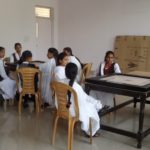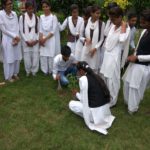STUDENT CODE & CNDUCT
Student Code of Conduct: Rules and Regulations
The following is a summary and explanation of the rights, responsibilities, and rules governing student conduct at G & R Institute of Management & Technology, Bulandshahr. This statement serves as a general framework and is not intended to provide an exhaustive list of all possible community infractions. Students violating community standards may be held accountable through the student conduct process. For a complete description of the College’s student conduct process, please see the section on Student Conduct Policies and Procedures.
Conduct expectations are outlined under the following policies:
Academic Misconduct
Academic misconduct is defined as a violation of the College’s standards of academic integrity whether these violations are intentional or unintentional. Academic misconduct consists of cheating on an exam, plagiarism on an academic assignment, or unauthorized collaborative work.
Evidence of academic misconduct may include, but is not limited to, the following:
- Some of the student’s work coincides with or closely paraphrases a source that is not properly acknowledged.
- Glaring coincidences in the work of students on exams, papers, problem sets, etc., where cooperation in producing the work was not permitted.
- Submission of the same work in more than one course. When submitting any work to an instructor for a course, it is assumed that the work was produced specifically for that course. Submission of the same work in more than one course without prior approval is prohibited.
- Not taking part in internal examination conducted by the college may result in non-acceptance of university examination from by the college (in case of a medical emergency proper document supporting the claim has to be submitted in order to get a relaxation from this rule)
Sources that must be acknowledged include, but are not limited to, lab manuals, books, articles in books, journal articles, and web pages, along with graphs, charts, tables, data sets, etc., in any of the sources just mentioned. Proper acknowledgment must indicate both the source and how it served as a source for any specific portions of the student’s assignment.
The informal nature of some writing may obviate the necessity of rigorously formal citation, but still requires honest attribution to original authors of all borrowed materials. Students should feel free to consult with instructors whenever there is doubt as to proper documentation.
Alcohol and Other Drugs
The unlawful possession, use, purchase, or distribution of alcohol on College property or as part of any College activity is prohibited. The unlawful possession, use, purchase, or distribution of illicit drugs, controlled substances (including stimulants, depressants, narcotics, or hallucinogenic drugs), or paraphernalia—or the misuse of prescription drugs, including sharing, procuring, buying, or using in a manner different from the prescribed use, or by someone other than the person for whom it was prescribed—is prohibited on College property or as part of any College activity & any student found indulged in such activity can be terminated after form the college by the disciplinary committee.
Assault, Endangerment, or Infliction of Physical Harm
Physical restraint, assault, or any other act of violence or use of physical force against any member of the community, or any act that threatens the use of physical force is forbidden. Conduct—whether reckless or intentional—that a person knows, or which any reasonable person under the circumstances would know, places oneself or another at risk of bodily harm is subject to disciplinary action, whether or not the risk is realized. The Head of disciplinary committee, in consultation with the Management Committee, will review the conduct and the circumstances in which it occurred and decide whether it falls under a minor or major adjudication. The more reckless the conduct and the greater the risk of serious bodily harm and/or the greater the actual bodily harm caused, the greater the likelihood of a severe sanction such as expulsion from the college.
Bullying, Intimidation, and Stalking
Bullying. Bullying includes any electronic, written, verbal, or physical act or a series of acts of physical, social, or emotional domination that is intended to cause or any reasonable person should know would cause physical or substantial emotional harm to another person or group. Bullying conduct may not only cause a negative effect on individuals targeted, but also others who observe the conduct. Bullying conduct is severe, persistent, or pervasive and has the effect of doing any of the following:
(i) substantially interfering with a community member’s education, employment, or full enjoyment of the college;
(ii) creating a threatening or intimidating environment;
(iii) substantially disrupting the orderly operation of the College; or
(iv) unreasonable actions directed towards an individual (or a group) resulting in intimidating, degrading, humiliating, or undermining behaviour that creates a risk to the health or safety of individuals.
Bullying is prohibited, and participating in such acts will result in disciplinary action which may also include expulsion from the college.
Intimidation. Intimidation is any verbal, written, or electronic threats of violence or other threatening behaviour directed toward another person or group that reasonably leads the person(s) in the group to fear for their physical well-being. Intimidation is prohibited and will result in disciplinary action which may also include expulsion from the college.
Stalking. Stalking is engaging in a course of conduct, repeated acts or communication toward another person, including unauthorized following, which demonstrate either an intent to put another person in fear of bodily injury or cause the person substantial emotional distress.
Anyone who attempts to use bullying, intimidation, or stalking to retaliate against someone who reports an incident, brings a complaint, or participates in an investigation will be in violation of retaliation as described within this Handbook and will be subject to disciplinary action.
When acts of bullying, intimidation, or stalking occur in the context of intimate-partner violence or when the behaviour is perpetrated on the basis of sex or gender, the conduct will be resolved under the Sexual Assault and Harassment Policy.
Discrimination, Including Harassment, Based On A Protected Class
Discrimination, including harassment, based on a protected class is defined as unreasonable, unwelcome conduct, based on an individual’s sex, race, colour, age, religion, national or ethnic origin, sexual orientation, gender identity or expression, pregnancy, marital status, medical condition, veteran status, disability, or any other legally protected classification, that objectively and subjectively harms the person by severely, persistently, and/or pervasively denies the person equal access to educational opportunities, residence and community life, or terms and conditions of employment. This type of discrimination can occur in any form and can be directed at individuals or groups. Depending on the severity of the circumstances, infractions may be resolved through a variety of appropriate methods, ranging from informal, remedial steps, including training, counselling, or mediation to disciplinary action, up to and including suspension or expulsion. In all cases, the College encourages individuals to seek support and assistance as soon as possible. Before any behaviour can be considered for the student conduct process, it must be clear that no substantial free expression interests are threatened by bringing a formal charge of discrimination. If a person has been subject to discrimination including harassment on the basis of a protected classification, as described above, the student should consult with the director of equal opportunity and engagement for guidance.
The College’s Sexual Assault and Harassment Policy specifically prohibits all forms of sexual misconduct, including sexual harassment, sexual assault, sexual exploitation, indecent exposure, intimate-partner violence, dating violence, and domestic violence, retaliation, stalking, and other misconduct that is sex or gender based, or in the context of an intimate partner relationship including: bullying and intimidation, stalking, physical assault, and discrimination.
If a person has been subject to sexual misconduct in any form, the person should consult with any member of the college faculty or office member and put forward a written complaint under the Sexual Assault and Harassment. G & R is very strict with such actions and the only punishment in such complaint is expulsion from the college.
Disorderly Conduct
Students at G & R Institute Of Management & Technology, Bulandshahr have the right to express their views, feelings, and beliefs inside and outside the classroom.
These freedoms of expression extend so far as expression does not impinge on the rights of other members of the community or the orderly and/or essential operations of the College. In light of the principles and expectations described within the policy on Academic Freedom and Responsibility, disorderly conduct is not permitted.
Disorderly conduct is a violation that prevents the orderly operation of the College, which includes, but is not limited to:
- Excessive noise, which interferes with classes, College offices, residence hall neighbours, or other campus and community activities;
- Unauthorized entry into or occupation of a private work area or closed meeting;
- Conduct that restricts or prevents faculty, staff, or student employees from performing their duties, including interruption of meetings, classes, or events;
- Failure to maintain clear passage into or out of any College building or passageway, and/or work space;
- Failure to disperse when a building, office, or campus space is closed;
- Other conduct that disrupts the operations of the College, such as lectures, meetings, events (such as admissions tours or job interviews), ceremonies, or other necessary business and community functions; and/or
- Any other action(s) that result in unreasonable interference with the learning/working environment or the rights of others.
Events and Parties
The College defines an event as an academic, intellectual, cultural, and/or social gathering, held by students or a student organization, in campus space. Events can be open to the entire campus community, open to all enrolled students, or closed events held for a smaller group of students and/or members of an organization. Usually, events are not open to the general public without written permission from the Office of Student Engagement.
- Open events are defined as an event where all students are permitted to attend. Open events may or may not be open to the larger campus community.
- Closed events may be held for a smaller group of students and/or members of an organization. A guest list may be required depending on the size and scale of the event. Close events can only be held after the written approval from college DEAN of student affairs & the management committee.
Failure to Comply
The College expects students to comply with the directions of law enforcement officers or College officials acting in the performance of their duties.
Furthermore, the College expects students held responsible for Student Code of Conduct violations to fully comply with all disciplinary sanctions imposed by the College. A responsible student’s failure to comply with imposed sanctions or any related directions of a College official in the performance of their duties will be subject to further disciplinary action.
False Representation
A student may not knowingly provide false information or make misrepresentation to any College office. In addition, forgery, alteration, or unauthorized possession or use of College documents, records, or instruments of identification, forged or fraudulent communications (paper or electronic mail) are prohibited and subject to disciplinary action.
Upon request, students are obligated to provide College personnel with accurate identification and must present their ID Card when requested. G & R office Department will accept a G & R Institute Of Management & Technology, Bulandshahr IDCard as proof of identification, our ID card is only valid for one year and onus of renewal is with the student only.
Retaliation
The College will not tolerate retaliation. Retaliation against any person or group who makes a complaint, cooperates with an investigation, or participates in a resolution process is a violation of College policy. Retaliation can take many forms, including continued abuse or violence, bullying, threats, intimidation, and stalking. Any individual or group of individuals, not just a complainant or respondent, can engage in retaliation.
Retaliation should be reported promptly to the Senior Associate Dean of Student Life and may result in disciplinary action independent of any sanction or interim measures imposed in response to the underlying allegation of misconduct.
Sexual Misconduct, Including Sexual Harassment, Sexual Assault, Sexual Exploitation, Indecent Exposure, Intimate-Partner Violence, Dating Violence and Domestic Violence, Retaliation, Stalking, and Other Misconduct that is Sex or Gender Based, or in the context of an Intimate Partner Relationship Including: Bullying and Intimidation, Stalking, Physical Assault and Discrimination
G & R Institute Of Management & Technology, Bulandshahr is committed to establishing and maintaining a community rich in equality and free from all forms of discrimination and harassment. The College seeks to create an environment in which the greatest academic potential of students and professional potential of employees may be realized. In order to create and maintain such an environment, the College recognizes that all who work and learn at the College are responsible for ensuring that the community is free from discrimination based on sex or gender, including sexual assault, sexual harassment, stalking, and intimate-partner violence. These behaviors threaten our learning, living, and work environments and will not be tolerated.
The College’s Sexual Assault and Harassment Policy prohibits all forms of sexual misconduct, including sexual harassment, sexual assault, sexual exploitation, indecent exposure, intimate-partner violence, dating violence and domestic violence, retaliation, stalking, and other misconduct that is sex or gender based, or in the context of an intimate partner relationship including: bullying and intimidation, physical assault and stalking, discrimination.
Smoking/Chewing of Tobacco or Pan Masala
Smoking, vaping, Chewing of Tobacco or Pan Masala is prohibited in all indoor & outdoor spaces throughout the College, including meeting rooms, lounges, offices. Violation(s) may result in a referral to student conduct, a fine, and/or other potential penalties, including exclusion from college.
Theft, Vandalism, or Property Damage
Theft, negligent, intentional, or accidental damage to personal or College property is prohibited, as is possession of stolen property. Restitution may be charged to the appropriate individual(s) and may warrant College disciplinary action. In the event that damage occurs in common space for which no one assumes responsibility, restitution may be divided equally among all the students present on the day the event occurred. Administrative fees may be added if students do not comply by the end of the semester.
For damage that occurs during a student event for which no individual student(s) accept(s) responsibility, the sponsoring students and/or organizations may be held accountable for the money for replacement or repair of the damaged property and may be subject to further disciplinary action.
Unauthorized Entry or Access
Unauthorized entry into or presence within enclosed College buildings or areas, including athletic facilities, construction sites, and class rooms or offices, even when unlocked, is prohibited. Climbing on any College building or College-owned structure or being present on building roofs is prohibited without authorization. Tampering with locks to College buildings, unauthorized possession or use of College keys, and alteration or duplication of College keys is against College policy. Participation in any of these activities may subject a student to fines and/or further disciplinary action.
Unauthorized Use of College Facilities or Services
The unauthorized use of College property, including but not limited to College buildings, spaces and grounds; College documents and records; or College furnishings, equipment and materials, is a violation of College policy and is subject to disciplinary action. The Acceptable Use Policy under Academic Policies provides guidelines for use of College computer systems and networks.
Violation of Local, State, or Federal Law
Any violation of local, state, federal, or international law may subject a student to College disciplinary action. A pending appeal of a conviction shall not affect the application of this rule.
Weapons and Fireworks
No student may possess or use a firearm on G & R Institute of Management & Technology, Bulandshahr property or its environs. Firearms, including rifles, shotguns, handguns, air guns, and gas-powered guns and all ammunition or hand-loading equipment and supplies for the same, are not allowed. No student may possess or use fireworks, dangerous devices, chemicals, or explosives on G & R Institute of Management & Technology, Bulandshahr property or its environs. Items such as knives that could be viewed as weapons are forbidden.
Any other item which may not be included in this handbook but is in violation of basic university or other laws may also cause disciplinary action on the student.




















